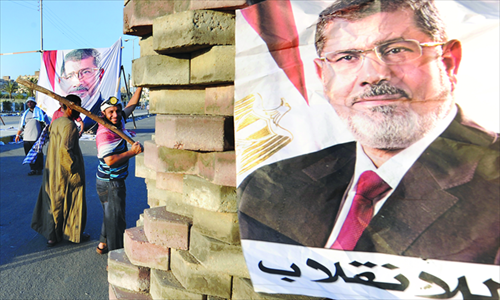Violence seizes Egypt

Supporters of the Muslim Brotherhood gesture as they stand close to an image of deposed president Mohamed Morsi at a makeshift brick barricade erected along a main street in Nasr City, a district of eastern Cairo, on Sunday, as supporters of Morsi continue to hold a sit-in outside Rabaa al-Adawiya mosque demanding his reinstatement. Photo: AFP
Loyalists of Egypt's ousted president Mohamed Morsi Sunday continued to defy the new government after the bloodshed on Saturday where government forces allegedly gunned down dozens of protestors. Sporadic violence broke out nationwide, marking a fierce political polarization in a country that has struggled since its transition to democracy began in February 2011.
At least two people were killed in two separate incidents, one in the Suez Canal city of Port Said, and the other in the town of Kafr el-Zayat in northern Egypt.
In Port Said, Mohamed Atteya, 18, was fatally shot after the funeral of a Morsi supporter killed in clashes in Cairo on Saturday, a security source told AFP.
The source said 28 others were injured, including two in critical condition.
On Saturday, at least 72 people were shot at a pro-Morsi sit-in in Cairo, while another nine died in violence in Alexandria.
Following the clashes near the Rabaa al-Adawiya mosque, where Morsi supporters have been camped out for weeks, Interior Minister Mohammed Ibrahim pledged to disperse the protests "soon."
Saturday's violence was the bloodiest incident since Morsi's July 3 ouster following huge demonstrations against his rule.
But it did not appear to have thinned the ranks at the Cairo demonstration, where a core group of several thousand protesters remained.
Gehad el-Haddad, a spokesman for the Muslim Brotherhood, said demonstrators were angry but "hugely defiant" after Saturday's deaths.
"For us, if we die, we meet our creator and we did so for a just cause... Either we die or we succeed," he told AFP.
Morsi supporters accused security forces of using live fire against unarmed protesters, but the interior ministry insisted that its forces had only fired tear gas.
Vice President Mohamed ElBaradei, who joined the transitional government, slammed what he called "excessive use of force."
Li Guofu, director of the Center for Middle East Studies at the China Institute of International Studies, told the Global Times there is no doubt that the fate of liberal groups is intertwined with that of the military for now, but ElBaradei may hope to distance his group from violence that has drawn international condemnation.
Saturday's killings took place the morning after Friday's mass demonstrations called by military chief Abdel Fattah al-Sisi to show public support for a crackdown on "terrorism."
Egypt's official MENA news agency Sunday reported that 10 "terrorist gunmen" were killed during security operations launched by the Egyptian army and police in the Sinai peninsula over the last two days.
He Wenping, a research fellow with the Institute of West Asian and African Studies at the Chinese Academy of Social Sciences, told the Global Times that Egypt is sliding into a "very dangerous" situation, given both the Brotherhood and military wouldn't concede easily.
"With Brotherhood's refusal to attend the political transformation process, there is less chance to find a peaceful solution," she said.
The military's role in the transition also raised concerns.
"Before Morsi's ouster, the disputes were between secularists and Islamists. And the military was standing in the middle," said Li. "The military has been controlling the interim government to target Islamists and it is walking onto the stage from behind the curtain."
The Al-Masry Al-Youm daily commented that the task of Egypt's military should be maintaining national security and social order instead of deciding the democratic political process. "If the military exerts excessive influence over politics, it would impede Egypt's democratic process," it said.
In a telephone conversation with his Egyptian counterpart Nabil Fahmy, Chinese foreign minister Wang Yi Sunday called on related parties to abandon violence and avoid more bloodshed. "China supports resolving disputes through dialogues and coordination, the restoration of the rule of law and order, and the advancing of an inclusive political transition in a steady fashion," Wang said, according to the foreign ministry's website.
US Secretary of State John Kerry, in a statement following calls with Egyptian officials on Saturday, urged all of Egypt's leaders to act to "help their country take a step back from the brink."
Agencies contributed to this story